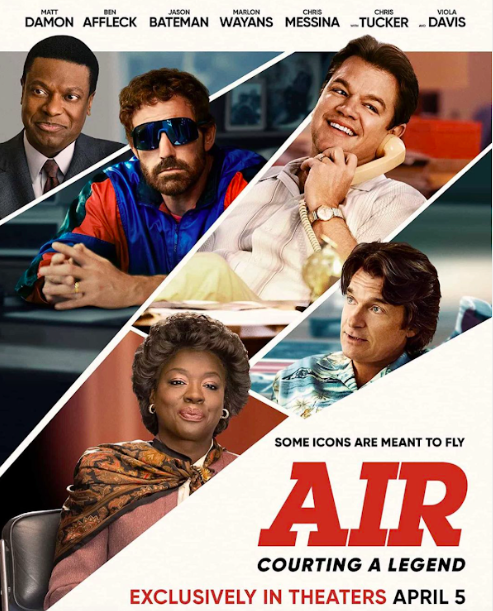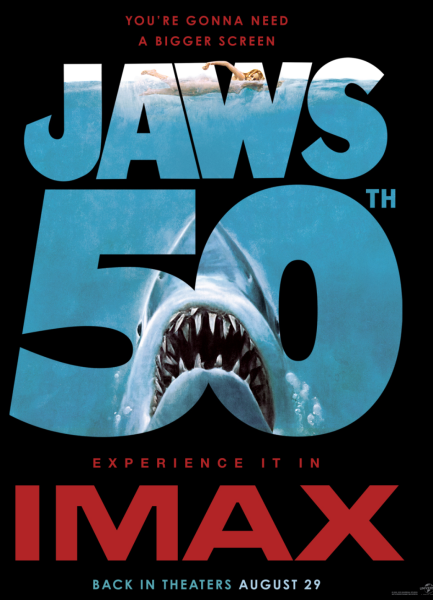“Air” Makes Immense Strides Through Theaters
Notorious for redefining Nike and the sports industry at large, Michael Jordan’s legacy continues to live on in the recent release of “Air.” As the face of the brand, Jordan has received plenty of recognition, but the brains behind securing such talent are largely unknown, aside from the occasional sports junkie. “Air” takes a brand-focused approach to highlight Nike’s early days in the industry and the acquisition of their then-rookie figurehead, Michael Jordan.
Artist Equity, a company recently co-founded by Matt Damon and Ben Affleck, embarked on “Air,” maintaining Jordan’s principles of receiving a cut of the revenue generated from the Jordan line. Damon felt that “thematically (“Air”) was on point in terms of what we’re trying to do with the new company. Sonny feels, like we do, that the people who are putting the value in something deserve to share in the revenue and be compensated, and rather than it be extractive, it’s a partnership.” Damon and Affleck followed through on these sentiments by providing all of the artists that worked on “Air” with additional compensation from the film’s increasing profits. The consistent theme of equitable pay provides cohesion between the movie and production company — an admirable decision of Artist Equity.
Overall, “Air” was a beautifully produced film with fan-favorite actors such as Jason Bateman and Viola Davis, along with Damon and Affleck. The movie was bound to be a success considering the highly talented cast. However, I initially had qualms with the portrayal of Jordan. Throughout the entire runtime, the basketball player is seldom shown, and when he is, his face is never revealed. I figured the choice was intentional, but it was a bit frustrating and sometimes distracting, considering the six-time NBA champion’s immense success. I thought his talent could have been showcased to a greater extent rather than talked about in abstract terms by Nike’s sports executive, Sonny Vacarro, and Jordan’s mother. Immediately after the movie concluded, I rushed to Google to find out the reasons behind Jordan’s absence from the film.
“Jordan is too big. He exists above and around the story, but if you ever concretize him, if you ever say, ‘Yes, that’s Michael Jordan,’ we know it’s not, really. I thought if the audience brought everything they thought and remembered about him and what he meant to them to the movie and projected it onto the movie, it worked better,” said Affleck. Knowing his reasoning, my preliminary feelings about the creative choice were challenged, and I now believe this was a genius move on Affleck and Damon’s part. If Jordan, played by Damian Delano Young, had been represented more fully in “Air,” the audience would most likely be left with an unsatisfactory depiction of the player, inhibiting the film’s success.
Throughout the film, Damon’s character, Vaccaro, harps on the importance of branding as Nike fights its way out of the shadows of other sports brands, namely Adidas and Converse. As Vaccaro debates ruthlessly with CEO Phil Knight, played by Affleck, about what it means to be Nike, he is convinced that Jordan is the unifying emblem that they need. In his speech that interrupts the chaotic Nike pitch to the Jordan family, he says, “A shoe is just a shoe until someone steps into it.” Here, he acknowledges Jordan’s impending status as an icon of American culture. “Air” nods to Jordan’s significance without trying to mimic his presence on screen. Instead, the movie inserts clips of his gameplay to remind the audience of his incredible talent without making it the plot’s focal point. “Air” functions more as a memoir of the necessary hard work to bring Nike into the limelight, instead of a highlight reel of Jordan’s life. The businessmen’s passion while pursuing a partnership with Jordan radiated off the screen and was inspiring to bear witness to — even for someone like myself, who is not an avid sports enthusiast. Apart from being a fundamentally entertaining film, “Air” was indicative of Affleck and Damon’s production morals, which are primarily responsible for its consistently high ratings since its release.















































































































































































































